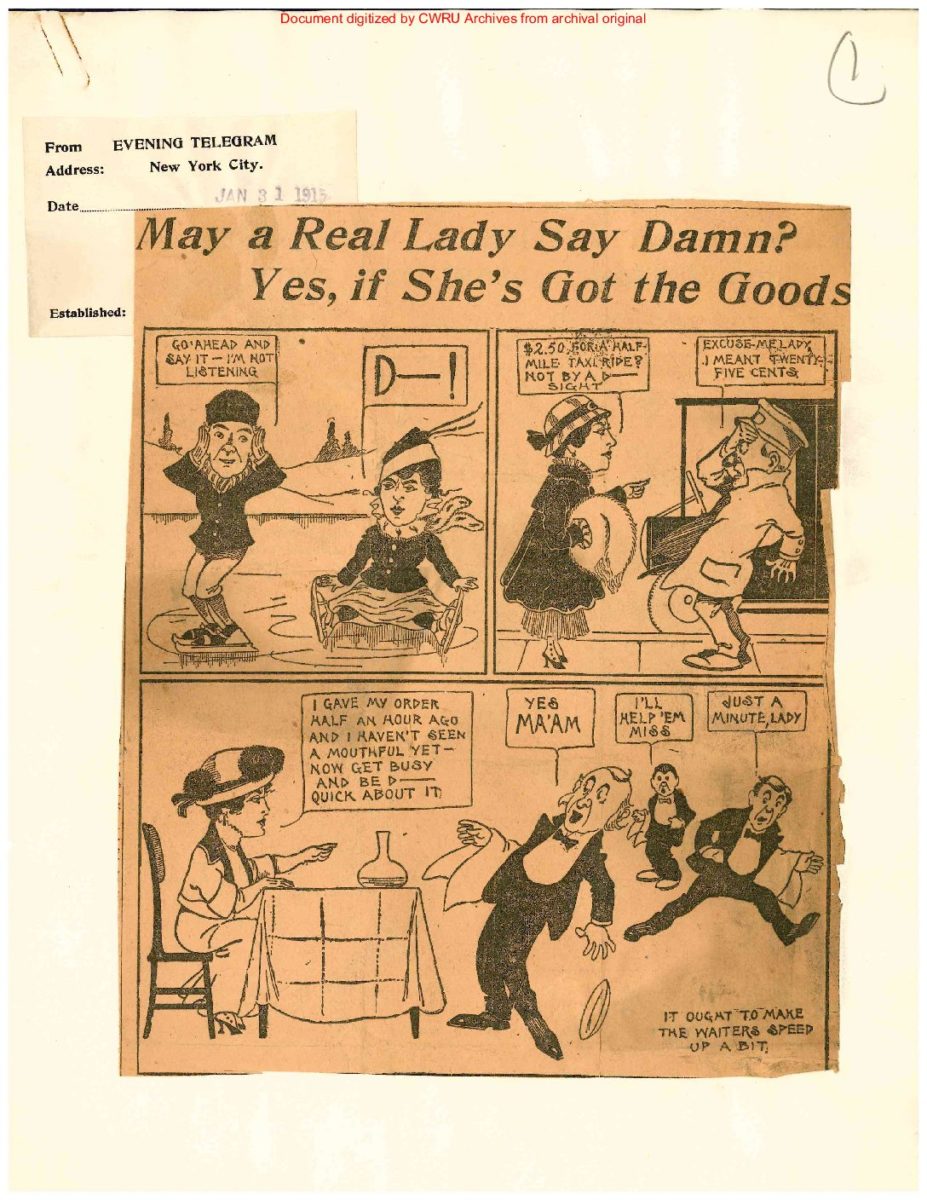With the federation of two universities—Western Reserve University and the Case Institute of Technology—Case Western Reserve University has a deep history. In the spirit of Homecoming, we will examine stories from CWRU’s past that are slightly bizarre and funny in order to appreciate the students that came before us.
Satire vs. President Cutler
President Carroll Cutler may be one of the most influential presidents in CWRU’s history. Before he became president, he enlisted into the Ohio Militia during the U.S. Civil War, becoming an officer to lead his own students. Once he became president, he made Western Reserve University coeducational, allowing for his daughter to attend the college. He also moved Western Reserve from Hudson, Ohio to Cleveland.
He never enjoyed criticism, though, which caused conflicts with Tempus, a Thanksgiving tradition. This is a satirical show put on by the students of Adelbert College, where they poke fun at themselves, their professors and the rest of the world.
The first Tempus occurred in 1858, where participants noted they gave speeches, “all of humorous nature, and after we had partaken of our cider and eaten our doughnuts, we had a procession, marching by the homes of the President and members of the faculty, cheering each place.”
In 1882, the year that the campus moved to University Circle, Cutler ordered that the year’s production be canceled. The year before, a member of the class of 1884 portrayed a woman who was in the Class of 1885, which Cutler incredibly disliked. As a result, he forbade the event publicly at a recitation with the entire Class of 1884: His only daughter was in the Class of 1885.
The class still put on the show.
The result was dramatic: “With the exception of a few, who had been providentially and otherwise prevented from taking part in Tempus, all members of the class were expelled” from Western Reserve University, according to “The Adelbert,” a book dedicated to Western Reserve University history. In solidarity, the other years went on strike, not attending recitations for a week.
Students from Ohio Wesleyan University proceeded to invite those expelled students from Adelbert College to their university, which made Ohio Wesleyan faculty threaten to expel their junior class as well. Under pressure, Cutler allowed the junior class back to the university under a probationary status. It took until after winter break for the junior class to resume their studies, while the Tempus tradition slowly started dying out.
Charles Thwing as a person
President Charles Thwing was CWRU’s longest serving president, active from 1890 to 1921. Known by the nickname of “Prexy,” many noted that he was one of the last personal university presidents—he knew students by name and frequently attended student-sponsored events and programs.
To say he was a character is an understatement. In 1915, he made national news for telling a first-year girls theology class that “I think it is all right to say even ‘Damn’” when he asked if the class swore.
“If some man did something terrible to you and you said ‘Damn that man’ that’s all right—that man should be damned,” was reported as his follow-up statement.
In another moment, Thwing once won a $250 prize—which is equivalent to $4,500 today–for first place in a Chicago newspaper contest for suggestions on how the U.S. can prevent future wars. To quote The Plain Dealer, Thwing explained, “I can’t remember what the suggestions were.” He ended up calling the prize “a joke.”
In essence, while he may have been a character, Charles Thwing was beyond impactful for the university. He opened the majority of graduate and professional programs that exist on campus today. Furthermore, he spent a large part of his career working for the NAACP and advocating for women’s education.
Stunt Night
In the Flora Stone Mather (FSM) College for Women, there was a tradition of an annual Stunt Night. The premise is relatively simple: each class performs an elaborate show every December for spectators to watch and a panel of alumni and faculty to judge.
Each class was responsible for writing and performing an original skit followed by a song. In addition, they were the ones responsible for creating the set and costumes for their performance. As the event became more popular, it moved from the campus gymnasium to even bigger theaters, like the Cleveland Masonic Temple. To celebrate, not only was there a dance at a downtown hotel, but there was an early morning breakfast in Haydn Hall.
A superb example of the type of stunts pulled is the winner of the 1945 Stunt Night. The junior class put on a play with the name “Adelbert or Die,” a parody on Romeo and Juliet. Romeo was Adelbert and Juliet was Mather, and the play was set in the phantom Western Reserveshire.
Flag Hunt
In the 20th century, the FSM College for Women had a university-sanctioned “Hazing Committee” which was in charge of traditions during Freshmen Week.
During Freshmen Week, there were traditional orientation events, including a predecessor of the Farm Harvest Festival—known as the Pink Pig Picnic—followed by tea with alumni.
The Hazing Committee stepped in for the event known as “Flag Hunt.” The premise is simple: a four-by-two inch flag will be hidden in any public space on campus and must be found by 4:25 p.m. The losing class will then have to wake up at 7:30 a.m. to report for institutionalized hazing. Students going through this process noted how losing students, who were always first years, had to dole “out candy and cigarettes to mooching sophomores and wears clothes that identify her as a queen species halfwit.” The Mather Record, a student newspaper for the women’s college, stressed how following hazing was lunch, which “shows the freshman that the sophomores are good sports too.”
The Observer vs. Alpha Phi
This is a bizarre Observer-related story: In October 1983, the CWRU chapter of the Alpha Phi sorority stole 4,000 copies of The Observer, valued at $5,000.
The following week’s issue proceeded to tell this dramatic tale: Cleveland Institute of Art (CIA) student Chris Luxem and a manager of the Thwing Center noticed two women walking out with an excessive amount of newspapers from Thwing. They followed the two women into a parking lot and “placed themselves in a position so that the car could not get to the exit without running them over.
“When the car stopped, a woman in the back handed Luxem a stack of newspapers. There were five persons in the car and the back seat was covered with Observers.” reported The Observer. The Thwing manager recognized one of the girls as being in the sorority: They were the subject of some unflattering news that week on The Observer’s front page.
Once word spread to The Observer’s staff, they sent reporters to Taplin House, the residence of the sorority at the time. These reporters were “thrown out by an irate member, who claimed that the reporters were trespassing and harassing the sorority. She threatened to call the police if they returned.”
In the next few weeks, Student Affairs made Alpha Phi pay $400 and issue an open letter of apology. Minutes from a University Media Board general body meeting stated how this money was used to increase security of its Thwing office.
KSL Slip and Slide:
In 2004, a group of CWRU students laid out a slip and slide and filled it with soap on the stacks of the third floor of Kelvin Smith Library (KSL). Former News Editor Phuong Nguyen uncovered the video which was unlisted on YouTube; later it was hidden.
Acknowledgments: The author would like to thank the staff at the CWRU Archives and Janice Gerda, the associate vice president of student engagement and learning, for their help in researching this article.




